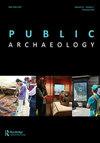Between Government and Grassroots: Archaeology as Advocacy in Southern Belize
IF 0.9
4区 历史学
0 ARCHAEOLOGY
引用次数: 1
Abstract
The consolidation of archaeology as a scientific discipline reinforced the power of the nation-state as archaeologists produced material and intellectual data that was used to bolster state identities at the expense of the history and heritage of Indigenous peoples. Accordingly, there are inherent structural inequalities within the discipline that favour researchers from Western nation-states in knowledge creation about the past. In this paper I explore the political implications of advocating for an equitable archaeological practice in Belize, Central America. Though archaeological research has incorporated grassroots engagement and community-based approaches, there is a gap in the discussion about negotiations with government officials. Among the issues surrounding grassroots advocacy is walking a ‘middle ground’ between negotiating with government officials for excavation permits and working closely with disenfranchised communities. Building relationships between registers of power supports the practice of a socially just archaeology abroad and could mitigate the structural inequalities inherent in our discipline. I illustrate this ‘middle ground’ with the Aguacate Community Archaeology Project, which I conducted in collaboration with Aguacate village, Toledo district, from 2012 to 2015. I explore the role of the archaeologist as an advocate for local communities’ control over knowledge produced on their community land.在政府和基层之间:伯利兹南部的考古宣传
考古学作为一门科学学科的巩固加强了民族国家的力量,因为考古学家以牺牲土著人民的历史和遗产为代价,产生了用于支持国家身份的物质和智力数据。因此,该学科内部存在固有的结构性不平等,有利于西方民族国家的研究人员创造关于过去的知识。在这篇论文中,我探讨了在中美洲伯利兹倡导公平考古实践的政治含义。尽管考古研究纳入了基层参与和基于社区的方法,但在与政府官员谈判的讨论中存在差距。围绕基层倡导的问题之一是在与政府官员谈判挖掘许可证和与被剥夺权利的社区密切合作之间走“中间路线”。在权力登记册之间建立关系支持了国外社会公正考古的实践,并可以缓解我们学科中固有的结构性不平等。2012年至2015年,我与托莱多区阿瓜卡特村合作开展了阿瓜卡特社区考古项目,以此来说明这一“中间立场”。我探讨了考古学家作为当地社区控制其社区土地上产生的知识的倡导者的角色。
本文章由计算机程序翻译,如有差异,请以英文原文为准。
求助全文
约1分钟内获得全文
求助全文

 求助内容:
求助内容: 应助结果提醒方式:
应助结果提醒方式:


